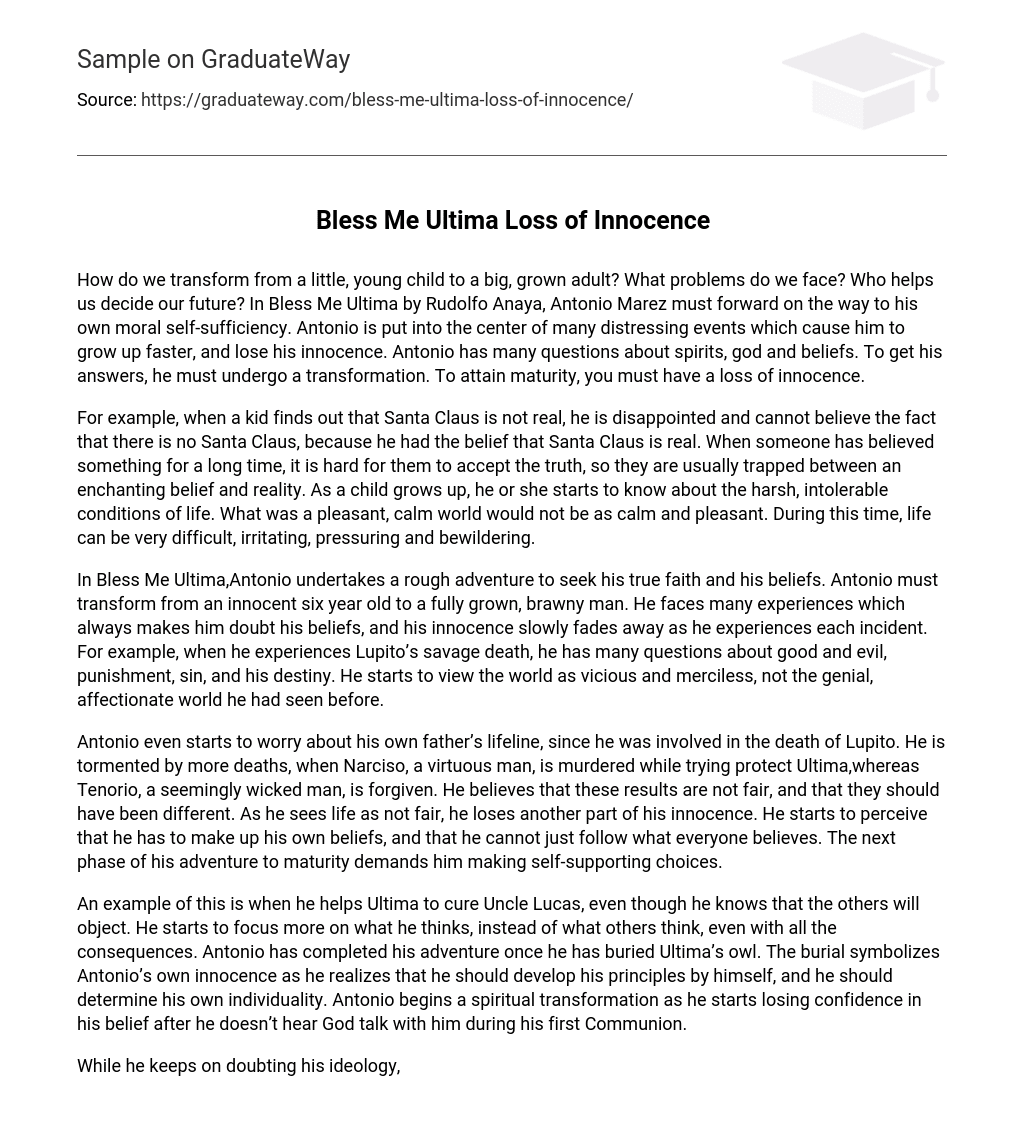In Bless Me Ultima by Rudolfo Anaya, Antonio Marez experiences a profound transformation from childhood to adulthood. Along his path, he confronts numerous obstacles that compel him to mature rapidly and shed his innocence. Antonio embarks on a quest for understanding, questioning spirits, god, and his own beliefs. In order to attain moral self-reliance, Antonio must relinquish his naivety.
Upon discovering that Santa Claus is fictitious, children go through a phase of disappointment and uncertainty as their prior faith in him crumbles. It can be challenging for individuals to embrace the truth after clinging onto a belief for an extended duration. They frequently find themselves torn between their enchanting beliefs and the harsh realities of life. As children grow older, they become conscious of the demanding and distressing facets of existence that were once unfamiliar to them. This shift from a tranquil and harmonious world to a more chaotic reality can render life arduous, frustrating, overwhelming, and bewildering.
Bless Me Ultima traces Antonio’s challenging quest to discover his true faith and convictions, propelling him from a naive child to a resolute and mature adult. Along this transformative journey, Antonio confronts numerous incidents that compel him to question his beliefs, ultimately leading to the gradual erosion of his innocence. One particular incident that contributes significantly to this transformation is the brutal demise of Lupito, which engenders doubts concerning fundamental concepts such as good versus evil, punishment, sin, and destiny. Consequently, Antonio’s perception of the world shifts from one characterized by kindness and love to one imbued with cruelty and implacability.
Antonio becomes anxious about his father’s participation in Lupito’s death and starts to fear for his father’s destiny. He is deeply disturbed by the deaths of other individuals, specifically Narciso, a noble man who was killed while defending Ultima, and Tenorio, a seemingly wicked man who is forgiven. Antonio perceives these outcomes as unjust and believes they should have been different. This realization of life’s unfairness further undermines his innocence and compels him to question accepted beliefs. Antonio comprehends that he must establish his own convictions and cannot simply conform to societal norms. This signifies the next phase of his journey towards adulthood, where he must make autonomous decisions.
One instance of this is illustrated when he assists Ultima in healing Uncle Lucas, despite knowing that it will likely face opposition from others. He shifts his attention towards his own thoughts and beliefs, disregarding the potential consequences. Antonio’s journey reaches its culmination when he lays to rest Ultima’s owl. This act symbolizes Antonio’s personal naivety as he recognizes the importance of developing his own set of principles and forging his own identity. Antonio commences a spiritual metamorphosis as he begins to doubt his faith after not hearing God communicate with him during his initial Communion.
Antonio continues to question his ideology but finds solace and guidance in the heathen God, the Golden Carp. He firmly believes that the Golden Carp has the ability to help him in his quest for theological clarity. This sacred experience with the Golden Carp deeply impacts Antonio, something he had hoped to experience during his first communion. Instead of blindly accepting Catholicism as his religion instructs, Antonio’s understanding of the Golden Carp allows him to explore his spiritual identity. He concludes that it is acceptable to doubt certain aspects of his beliefs.
As he explores his spiritual practices, he is also introduced to different religious beliefs, culminating in a complete spiritual transformation. Furthermore, Antonio’s friends play a crucial part in shaping him into a more independent person. Initially, when he begins school, he experiences fear towards his peers and lacks the capacity for independent thought. Nevertheless, as he advances academically, he forms a strong connection with Samuel and Florence who assist him in becoming more self-reliant by lessening his reliance on his mother. This newfound assurance empowers him to make important choices independently.
The process of Antonio’s unique development commences as he embarks on a demanding expedition towards maturity within a span of two years. He is no longer the youthful and naive boy he once was, but has emerged as a resilient and sophisticated individual. These encounters have resulted in the forfeiture of his innocence, yet they have also bestowed upon him the fortitude that will navigate him through forthcoming challenges and revelations. Throughout these tribulations, he has morphed into the resolute and mature man he will soon evolve into. Such metamorphoses are indispensable for personal advancement, notwithstanding the hardships they may entail.





